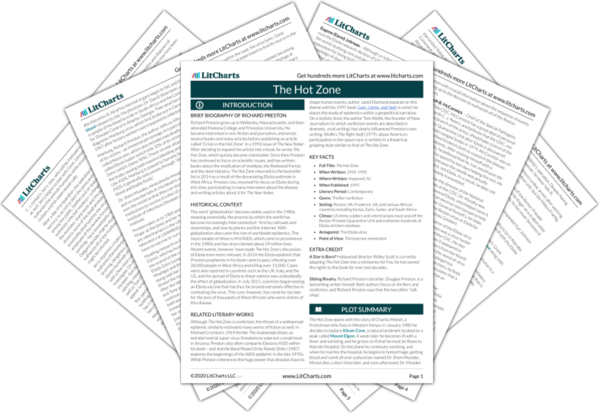Summary
Analysis
As Nancy dissects the monkeys, C. J. Peters runs a huge meeting in the conference room of Fort Detrick. General Russell sits in to chair the meeting, hoping to keep it from turning into a contest between the Army and the C.D.C. Dan Dalgard is there as well, outwardly calm but inwardly nervous. Also present is a glaring Gene Johnson, officials from the Virginia and Fairfax County Departments of Health, Fred Murphy, and the chief of the Special Pathogens Branch of the C.D.C., Dr. Joseph B. McCormick. Brilliant, charming, and hot-tempered, Joe McCormick has actually treated human cases of Ebola. He also has a longstanding rivalry with Peters. The meeting begins with Peter Jahrling explaining that there is a strain of Ebola infecting the monkeys. Next a nervous Dalgard explains the symptoms that he has observed. After this, Joe McCormick speaks. Preston explains that the Army people in the room find his words condescending and dismissive, while McCormick asserts (later) that he was simply offering “help or assistance.”
This meeting, like so many events and actions in the narrative, has both a positive and a negative side. On one hand, the multiplicity of officials and departments included in it emphasizes how seriously all involved are taking the potential outbreak. On the other hand, the squabbling within the ranks (especially between C. J. Peters and Joseph McCormick, a conflict that symbolizes the tension between the C.D.C. and USAMRIID) makes it clear that even during times of crisis, humans are still unable to entirely put aside their petty rivalries. The effort to combat Ebola has begun in earnest, but it is hampered by human jealousy and desire for control.
Themes
Preston recounts the history of conflict between the Army and Joe McCormick, who had in the past criticized Gene Johnson for spending money studying Kitum Cave without publishing his findings. McCormick also feels that his knowledge of Ebola is superior because he was on the ground in 1979 in Sudan during an outbreak. Although Sudan was in the midst of a civil war, McCormick, along with a C.D.C. doctor named Roy Baron, flew into Sudan and located villages infected with the virus.
Preston expands on the backstory of Joe McCormick, another crucial figure in the battle against Ebola. McCormick has, as it turns out, earned his reputation, having displayed immense courage and dedication when confronted face-to-face with actual human Ebola cases.
Themes
Years later McCormick would describe the sight of a hut filled with Ebola victims, reeking with blood, and scattered with distorted, horrific corpses. Armed only with rubber gloves, a surgical gown, paper boots to protect his shoes from blood, and a surgical mask, McCormick began drawing blood samples and caring for patients. As he tried to draw blood from a woman in the midst of a seizure, McCormick jabbed his own thumb with a bloody needle. Knowing that he had been exposed, he decided to stay in the hut and help his patients until he fell ill. Baron tried to give him a transfusion of a blood serum from Africans who had survived Ebola, hoping that this might help McCormick survive. For the next four days McCormick worked in the hut, only to discover, miraculously, that the woman had been ill not with Ebola, but with malaria—he had not been exposed after all.
McCormick’s story reintroduces the concept of human fragility, and the power of luck or chance—one of the foremost researchers of Ebola was still completely at the mercy of the virus, unable to protect himself against the power of nature and the pitfalls of human error. Meanwhile, objects such as rubber gloves, a surgical gown, and a mask—which usually convey a sense of security and protection—here seem ludicrously useless when compared to the spacesuits and oxygen tanks that scientists such as Nancy Jaax use when handling Ebola.
Themes
His experience in Sudan led Joe McCormick to believe that Ebola did not spread easily, and he questions whether it is as dangerous as the Army asserts. Dan Dalgard, meanwhile, asks how soon the Army will be able to confirm whether the monkeys are sick from the virus. C. J. Peters says it may take a week. McCormick, however, argues that he can perform a quick test in twelve hours, and that the C.D.C. should get the virus and the samples. Peters is furious, believing that McCormick is trying to gain control over the situation. He asserts that “[a]n ongoing epidemic is not the time to try to field-test a new technique,” and adds that Fort Detrick is closer to the outbreak than the C.D.C.’s headquarters in Atlanta. He does not add, however, that the Army is already in possession of both the monkey corpses and the virus. Fred Murphy urges McCormick to cool down, while General Russell steps in, suggesting that the Army and the C.D.C. split management. Eventually they come to the agreement that the C.D.C. will oversee any “human-health aspects of the outbreak” while the Army will “handle the monkeys and the monkey house.”
While Joe McCormick has undoubtedly shown immense courage during his time in Africa, his conclusion is a dangerous one, born out of hubris and complacency—and yet it could be argued that Preston leans too far in the opposite direction, playing up the “scare factor” of Ebola’s contagiousness, when in fact it hasn’t spread as profusely as he fears. Either way, McCormick becomes an ambiguous figure, one who clearly understands a great deal about Ebola and has confronted it head-on, but whose judgment is clouded by his own pride and possessiveness. Eventually, however, all the involved parties are able to come to a solution—the effort to contain the possible Ebola outbreak has moved one step forward, however slowly. From this moment on, the momentum and sense of urgency in the narrative begins to pick up.
Themes
Get the entire The Hot Zone LitChart as a printable PDF.













